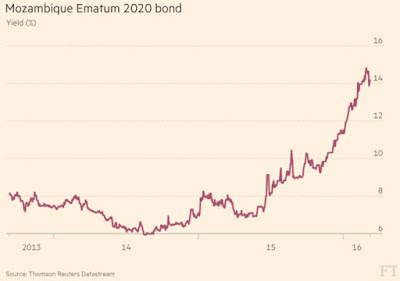This post may well be worth revisiting once every few years. I had earlier cautioned about the irrational exuberance (Zambia raised $750 m in 2012 at a yield lower than Spain!) surrounding African Eurobond issuances. In particular, my concern was that, apart from misuse and pilferage, depreciating currencies, revenues-repayment currency mismatch due to investments in infrastructure, and inadequate due-diligence posed insurmountable credit risks.
Now the African sovereign Eurobond bubble has burst and the consequences are becoming evident. The poster child was Mozambique's $850 m Tuna Bond issue of 2013 to finance state-backed fishing fleet to develop a fishing industry. The bond was issued by Ematum, a tuna-fishing company, backed by the government and attracted considerable global interest and is currently held by some of the world's most reputed institutional investors. Instead, atleast $500 m was used to procure naval boats and other logistics for maritime security, with the inevitable associated rents. The result,
Mozambique was viewed latterly as a burgeoning African success, partly in anticipation of production at vast, offshore gasfields. It now stands among the first instances of fallout from the boom in emerging market debt which has driven billions of dollars into countries with poor credit profiles. Foreign reserves are dwindling, the fiscal deficit is yawning and devaluation of the metical could drive debt to gross domestic product ratios above 100 per cent this year
The expected problems surfaced. The currency depreciated,
... and the yields surged
In March this year, in the first round of inevitable restructuring, $700 m worth of 2020 Tuna Bonds were swapped for 2023 sovereign bonds. In the process, it came to light that certain state entities had assumed $1.4 billion worth of undisclosed external debt. It adds another 10% of GDP to the country's debt burden. Donors, including the IMF, were predictably furious. The IMF temporarily suspended ongoing lending. The prognostications could not have been any more accurate!
Much the same is happening or likely to happen with the others in Africa. The expected oil bonanza has not happened, economic growth has tanked, and the yields have risen. And, most likely, the money has been misspent or even siphoned away. This is also confirmation that the original sin hypothesis is alive and strong.


No comments:
Post a Comment